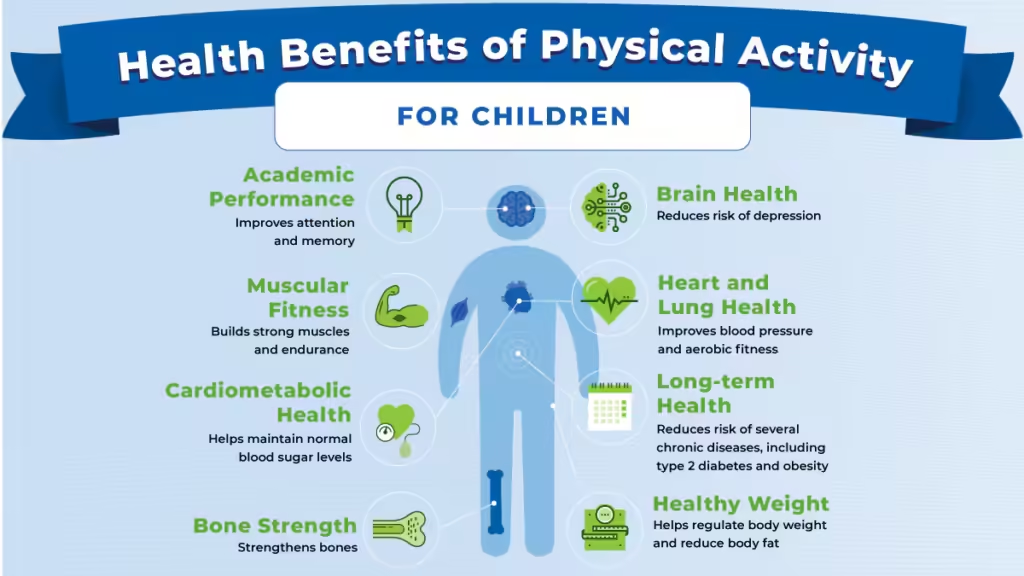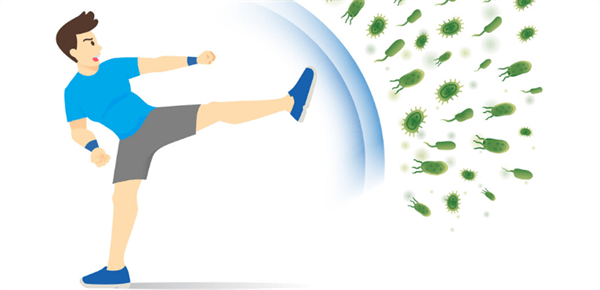Physical fitness enhances overall health by improving heart health, muscle strength, mental well-being, and supporting longevity.
In this article, we will explore what physical fitness does and delve into its profound benefits for your body, mind, and overall quality of life.
Enhances Cardiovascular Health:

The heart is at the center of your circulatory system, and its health is vital for overall wellness. Regular physical fitness activities significantly improve cardiovascular health by:
- Strengthening the Heart Muscle: Just like any muscle in your body, your heart becomes stronger with regular exercise. A stronger heart pumps more blood with each beat, which improves overall circulation.
- Lowering Blood Pressure: Consistent physical activity helps to lower blood pressure levels, reducing the risk of heart-related issues. Exercise improves the flexibility of blood vessels, allowing them to expand and contract easily.
- Enhancing Cholesterol Levels: Regular exercise can help raise high-density lipoprotein (HDL) cholesterol, often referred to as “good” cholesterol, while lowering low-density lipoprotein (LDL) cholesterol, the “bad” cholesterol. This balance is crucial in reducing heart disease risks.
Engaging in a variety of cardiovascular exercises—such as jogging, cycling, swimming, and dancing—can lead to a robust cardiovascular system that supports long-term health.
Enhances Muscle Strength and Stamina:
Muscle strength and endurance are vital components of physical fitness. Strength training not only helps you look fit but also contributes to various aspects of health:
- Daily Activities: Improved muscle strength makes everyday tasks easier, whether lifting groceries or climbing stairs.
- Posture and Balance: Strengthening core muscles supports better posture, which can alleviate back pain and enhance balance, reducing the risk of falls—especially important as we age.
- Metabolic Rate: More muscle mass means a higher resting metabolic rate, which helps in maintaining a healthy weight. Muscle tissue burns more calories than fat, even when the body is at rest.
To achieve optimal muscle strength, it’s essential to incorporate resistance training exercises, such as weightlifting, resistance bands, or bodyweight exercises, into your weekly routine two to three times for optimal results.
Aids in Weight Management:
Maintaining a healthy weight is one of the most recognized benefits of physical fitness. Regular physical activity burns calories and helps balance the number of calories consumed through diet:
- Caloric Deficit: To lose weight, you need to burn more calories than you consume. Physical fitness creates this caloric deficit, facilitating weight loss and fat reduction.
- Increases Lean Body Mass: Regular strength training helps to build lean muscle, which can increase your metabolism and help you maintain weight loss over time.
- Promotes Healthy Eating Habits: Engaging in physical activity often encourages healthier eating choices, creating a positive cycle of health and fitness.
Incorporating both aerobic exercises and strength training into your fitness regimen is key to effective weight management.
Also Read: Is It Effective To Go To The Gym Every Day – Is It Effective or Risky!
Enhances Mental Health and Mood:
The mind-body connection is powerful, and physical fitness significantly influences mental health. Here are some ways exercise can enhance your emotional well-being:
- Release of Endorphins: Physical activity stimulates the production of endorphins, neurotransmitters that act as natural painkillers and mood elevators. This “runner’s high” contributes to feelings of happiness and euphoria.
- Reduction of Stress and Anxiety: Exercise lowers levels of the body’s stress hormones, such as cortisol. It also helps alleviate symptoms of anxiety and depression, making it an effective natural treatment for these conditions.
- Improved Sleep Patterns: Regular physical activity can improve sleep quality, leading to better rest and recovery. Quality sleep is essential for mental health and overall well-being.
Research has shown that just 30 minutes of moderate exercise can lead to noticeable improvements in mood and stress levels. Activities like yoga and tai chi also incorporate mindfulness, enhancing mental clarity and emotional stability.
Improves Sleep Quality:

Sleep is critical for recovery, cognitive function, and overall health. Physical fitness contributes to improved sleep quality in several ways:
- Faster Sleep Onset: Regular exercise can help you fall asleep faster and enjoy deeper sleep cycles, leading to more restorative rest.
- Reduced Insomnia Symptoms: Engaging in physical activity can reduce the symptoms of insomnia and other sleep disorders, making it easier to achieve restful sleep.
- Circadian Rhythm Regulation: Regular physical activity helps to regulate your body’s internal clock, promoting a consistent sleep schedule.
However, it’s essential to time your workouts appropriately. Exercising too close to bedtime can energize the body and interfere with your ability to fall asleep, so aim to finish intense workouts at least a few hours before bedtime.
Increases Energy Levels:
While it may seem counterintuitive, engaging in regular physical fitness can actually increase your energy levels:
- Enhanced Circulation: Physical activity increases blood flow and oxygen delivery to muscles and tissues, improving overall energy efficiency.
- Reduced Fatigue: Regular exercise can combat fatigue, making you feel more energized throughout the day. Many people report increased stamina and reduced feelings of tiredness after consistent exercise.
- Boosted Confidence: Achieving fitness goals, whether small or large, can lead to improved self-esteem and motivation, further fueling your desire to stay active.
Incorporating short bursts of activity throughout the day—such as walking during breaks or taking the stairs—can also contribute to increased energy levels.
Also Read: How Often Should You Exercise – A Comprehensive Guide!
Supports Healthy Aging:
As we age, maintaining physical fitness becomes increasingly important for overall health and quality of life:
- Prevention of Chronic Diseases: Regular exercise can lower the risk of developing chronic diseases such as heart disease, diabetes, and certain cancers, contributing to a longer, healthier life.
- Mobility and Independence: Staying active helps to preserve muscle mass and strength, which are critical for maintaining mobility and independence as we age.
- Social Engagement: Joining fitness classes or community sports can provide social interaction, combating feelings of isolation and loneliness often experienced in later years.
Tailored fitness programs for seniors, which include strength, balance, and flexibility exercises, can help maintain functional abilities and promote a healthy lifestyle.
Boosts Immune Function:

A robust immune system is essential for fighting off illness and maintaining overall health. Physical fitness can enhance immune function in several ways:
- Increased Circulation of Immune Cells: Exercise boosts the circulation of immune cells, making your body more efficient at detecting and fighting infections.
- Reduced Inflammation: Regular moderate exercise can help reduce inflammation in the body, which is linked to many chronic diseases.
- Improved Vaccination Responses: Staying physically active may improve the effectiveness of vaccines, enhancing your immune response.
However, it’s important to strike a balance, as excessive exercise or overtraining can weaken the immune system. Moderation is key for optimal immune health.
Promotes Longevity:
Numerous studies have shown that individuals who engage in regular physical activity tend to live longer and healthier lives. Key factors contributing to longevity include:
- Reduced Mortality Risk: Regular exercise lowers the risk of premature death by reducing the incidence of chronic diseases and improving overall health.
- Enhanced Quality of Life: Staying fit promotes independence, mobility, and a better quality of life as you age, making it easier to enjoy activities and maintain social connections.
- Increased Resilience: Physically fit individuals often have better resilience against life’s stresses, contributing to a more positive outlook and longer lifespan.
Builds Confidence and Self-Esteem:
Physical fitness has a profound impact on self-image and confidence levels. Here’s how exercise can boost your self-esteem:
- Achievement of Goals: Setting and achieving fitness goals can foster a sense of accomplishment and motivate you to tackle other challenges in life.
- Positive Body Image: Regular exercise can help improve body composition and appearance, leading to a more positive self-image and increased self-confidence.
- Social Interactions: Engaging in group activities or sports can enhance your social circle and provide a sense of belonging, which contributes to improved self-esteem.
FAQ’s
1. What does physical fitness do for your heart?
Physical fitness strengthens the heart, lowers blood pressure, and improves cholesterol levels, reducing the risk of heart disease.
2. How does physical fitness aid in weight management?
It burns calories, increases lean muscle mass, and helps balance diet and exercise for effective weight control.
3. Can physical fitness improve mental health?
Yes, regular exercise reduces stress, anxiety, and depression while releasing endorphins that boost mood.
4. Does exercise help with sleep?
Physical activity improves sleep quality, reduces insomnia, and helps regulate your body’s sleep-wake cycle.
5. How does physical fitness support healthy aging?
Exercise prevents chronic diseases, maintains mobility, and promotes independence in older adults.
Conclusion
In conclusion, physical fitness plays a critical role in improving overall health, from strengthening the heart and muscles to boosting mental well-being and enhancing sleep quality. It supports weight management, increases energy levels, and promotes longevity by reducing the risk of chronic diseases. Regular exercise fosters a positive lifestyle, contributing to healthier aging, a stronger immune system, and improved confidence.